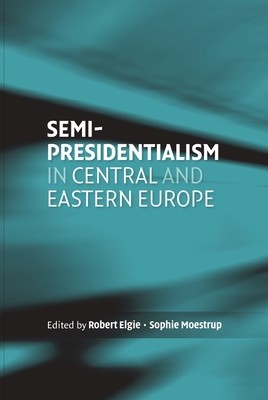
- We will send in 10–14 business days.
- Publisher: Manchester University Press
- ISBN-10: 0719075351
- ISBN-13: 9780719075353
- Format: 15.8 x 23.9 x 3.1 cm, hardcover
- Language: English
- SAVE -10% with code: EXTRA
Semi-presidentialism in Central and Eastern Europe (e-book) (used book) | bookbook.eu
Reviews
Description
This book examines the extent to which semi-presidentialism has affected the process of democratisation in Central and Eastern Europe since the early 1990s. The standard academic wisdom is that semi-presidentialism, where there is both a directly elected president and a prime minister who is responsible for the legislature, is a risky choice for nascent democracies because of the in-built potential for conflict between the president and the prime minister. This book demonstrates that semi-presidential regimes can operate in quite different ways, some with very strong presidents, some with strong prime ministers and ceremonial presidents and some with a balance of presidential and prime ministerial powers. In particular, the book analyses the specific impact of the various forms of semi-presidentialism that can be found in Central and Eastern Europe. With chapters on Bulgaria, Croatia, Lithuania, Macedonia, Moldova, Poland, Romania, Russia, Serbia, Slovakia, Slovenia and Ukraine,
the book explores whether some forms of semi-presidentialism are more conducive to democratization than others.It also looks at how semi-presidentialism may have helped democracy to survive and examines its impact on government performance in terms of stability and policy-making.
EXTRA 10 % discount with code: EXTRA
The promotion ends in 15d.15:07:14
The discount code is valid when purchasing from 10 €. Discounts do not stack.
- Publisher: Manchester University Press
- ISBN-10: 0719075351
- ISBN-13: 9780719075353
- Format: 15.8 x 23.9 x 3.1 cm, hardcover
- Language: English English
This book examines the extent to which semi-presidentialism has affected the process of democratisation in Central and Eastern Europe since the early 1990s. The standard academic wisdom is that semi-presidentialism, where there is both a directly elected president and a prime minister who is responsible for the legislature, is a risky choice for nascent democracies because of the in-built potential for conflict between the president and the prime minister. This book demonstrates that semi-presidential regimes can operate in quite different ways, some with very strong presidents, some with strong prime ministers and ceremonial presidents and some with a balance of presidential and prime ministerial powers. In particular, the book analyses the specific impact of the various forms of semi-presidentialism that can be found in Central and Eastern Europe. With chapters on Bulgaria, Croatia, Lithuania, Macedonia, Moldova, Poland, Romania, Russia, Serbia, Slovakia, Slovenia and Ukraine,
the book explores whether some forms of semi-presidentialism are more conducive to democratization than others.It also looks at how semi-presidentialism may have helped democracy to survive and examines its impact on government performance in terms of stability and policy-making.


Reviews